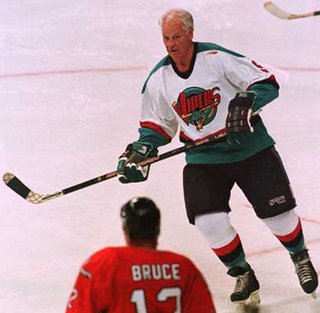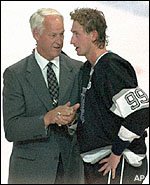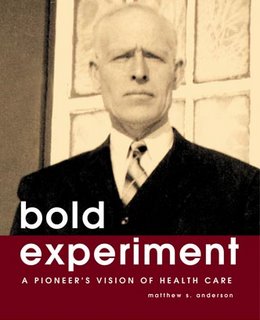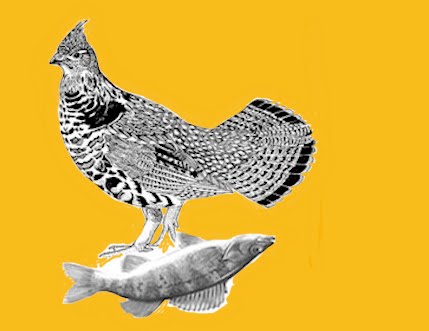
A long, long time ago – to be precise 78 years to this day - in Floral, Saskatchewan there was born unto a humble immigrant farm couple, a son. Hard work and some of the most incredible gifts any athlete, anywhere ever possessed led young Gordon to the National Hockey League in 1946 and the beginning of a career unlike any other in modern sports history.
I grew up on the South Shore of Montreal and cheering stridently at the old Montreal Forum for Howe and the Red Wings was one of the earliest manifestations of my contrarian disposition – for at that time in the late 1950s, the era of Detroit being at least a strong contender for the mighty Canadiens was pretty well over. Les Habs rolled to five consecutive Stanley Cups and the fact of Detroit having finished first in the league (the Prince of Wales Trophy) was largely eclipsed by Montreal’s achievements. All the more reason for a sawed-off little Anglo curmudgeon-in-training to be bellowing out “Go Gordie Go” amidst the din in the very spiritual core of Quebecois pride (the same epicentre, not long before, of the infamous riots over the suspension of Rocket Richard).
Once a year, just about this time when Detroit would be visiting, I’d take my saved up allowance and blow it on a card and a box of Laura Secord chocolates, then wait excitedly outside the visitor dressing-room at the Forum and pass it to me hero. In return I got my hand shook, my hair tussled and a card of thanks with the Gord’s autograph sometime within the ensuing week.
During the many years I followed Howe’s exploits, I was convinced that he was, as an corny song of the time by Big Bob and the Dollars rang out, “the greatest of them all” (for full lyrics scroll down on this page). Not that there were no other plausible claimants back in that era – Maurice Richard of course comes to mind but also the graceful and gentlemanly Jean Beliveau and the raw

power hawg, Bobby Hull. later, along came Bobby Orr the only player who to this day is the only guy who ever so slightly shook my confidence in Gordie’s primacy although honourable mention in the pantheon of aspirants must also go to the recently departed Mario Lemieux and the now-almost-utterly-forgotten player, Gilbert Perrault.
I have successfully gone several paragraphs without the W-word – Wayne, that is and I am sure the clamouring horde of readers, especially those who have detected in earlier postings a certain antipathy on my part towards Gretzky – are waiting for that skate to drop. Alas, it is not possible, given the ubiquitous oodles of stats and records and the mighty publicity machine that has worked for the past quarter century around this ill-clept “Great One”, to avoid saying precisely why and how Howe was his better, by far.
By way of sliding into this rant, allow me to relate a moment of revelation that came to me while listening to some colour commentator on Hockey Night in Canada. Some player who’d been scoring at a hectic pace at the time was the topic and the frenetic announcer said “Hey, he’s getting the goals and that’s the name of the game.”
No, I spake aloud, goals is not the name of the game: hockey is. This utterly unprofound observation got me to thinking more deeply about the exaltation of individual players on the sole attribute of scoring and how that had become the basis for what today is the seemingly unchallenged mantra about Gretzky being the greatest ever hockey player, i.e. because of his lion’s share of NHL scoring records.
I saw Gretzky play on several occasions in the flesh and, of course, many times on the tube. Seen live, his strategy of avoiding the nitty-gritty work in the corners - the jousting and elbowing and scrambling needed to gain possession of the puck, was pitifully clear. When the play was in his team’s end of the ice, Gretzky would be slowly circling around outside his team’s blueline waiting for a pass from far better all-around players like Messier and Coffey. Once he had the puck, a career-long unwritten but universally understood proscription against so much as brushing up against him would go into effect, enforced, of course, by Sather's stable of oversized brutes.
Indeed it was only when Gretzky came along that the notion so common today arose that superstars were untouchable. Gordie Howe - and the Rocket and the Golden Jet – didn’t get picked on a lot either but it was because they – not otherwise talentless bully-boys – were quite able and willing to demonstrate the consequences of undue aggression that might otherwise inhibit their brilliant play. One need only call to mind what happened to the NHL’s to-that-point lead brawler, Lou Fontinato when he decided to tangle with Howe. That now legendary encounter on February 1,1959 ended with “Leapin’ Louie” in reconstructive facial surgery. The rough and tumble whether in drop-your-gloves donnybrooks, dubiously legal infighting or just darn good clean hard body-checks was something that Howe excelled at in addition to scoring prowess and which Gretzky nimbly avoided for his entire career.
Indeed, it was not only his drooling henchmen and Coach Sather who bought Wayne a lifetime free pass, but complicit referees and their superiors to the highest levels of the NHL. “Aha! A conspiracy theory”, says you, the League allowing, even condoning strong-arm tactics that gave the indisputably offensively talented Gretzky free rein to run up incredible scoring records.
Tripe, you say? Not quite so fast there, my friend. Consider if you will a moment what the benefits were for the NHL to manufacture the myth of Gretzky and the fabrication of so seemingly dominant icon. At a time when the obvious dilution of talent by rapacious expansion would otherwise have been emptying the arenas, the feats of the well-cosseted young Gretzky were the made-to-order remedy. Motive and opportunity there were aplenty to provide the regulatory environment for a seemingly superlative performance. Thus Gretzky’s natural scoring prowess was hugely inflated by the ubiquitous tolerance of his teammates intimidation of opposing players. Gord did his own intimidation which, like it or not, is part of the armoury of the complete player, something Gretzky was never close to being.

Howe was a nonpareil class act off ice as well. His teams missed play-offs and the last thing he would have ever dreamed of was the kind of disgraceful display we saw with Gretzky who dissed his entire team in L.A. in early 1996. Seemed that Wayne felt he deserved a better career ending than with the lowly Kings. Unlike past superstars who quickly figured out that if your team’s not playing well you should lead them out of it, not blubber about being traded. But Gretzky whined until he was indeed traded off to St. Louis (who to my consummate pleasure bombed out of the playoff contention pretty quickly that year, shortly after which Gretzky fittingly got himself traded again into the glitz of Broadway for his discordant swan song).
This sense of entitlement, spurred on no doubt by the self-serving league and press was not some late-career peccadillo but something seen right from day one when Gretzky picked out 99 for his sweater as a rookie. For those who recall the numerology of the original six NHL the message he wanted to send was unmistakable. 9 had been Howe’s number also Maurice Richard’s and, in the final years of his career, Bobby Hull’s. Other original six teams tended to give nine to their highest scorer like Andy Bathgate on the Rangers and Johnny Bucyck on the Bruins. Doubling it up, and choosing a number that could not easily be exceeded across a player’s back was the Whiner's early assertion of being the top dog ever sent out before he even laced up the skates for his pro debut.
Despite this arrogance, so foreign to the famously modest Gord, in the final days in 1994 of this cossetted egotist’s inevitable overtaking of Howe’s scoring record, the Greatest once again showed what a class act he was by following Wayne about good-naturedly to be there to salute the man who’d beat his record
 whenever and wherever it happened. As difficult as it is to imagine anyone anytime soon approaching Gretzky’s well-oiled scoring records, it’s that much harder to think of the alleged Great One displaying any such magnanimity (just think of how he cut young Crosbie from this year's Olympic squad a thinly veiled and ultimately backfiring strategy to keep the spotlight on himself).
whenever and wherever it happened. As difficult as it is to imagine anyone anytime soon approaching Gretzky’s well-oiled scoring records, it’s that much harder to think of the alleged Great One displaying any such magnanimity (just think of how he cut young Crosbie from this year's Olympic squad a thinly veiled and ultimately backfiring strategy to keep the spotlight on himself). Hockey greatness is not just about racking up points when your bully-boys are there to give you a free pass around perfectly legal body-checking: it’s about doing the whole game well and being an exemplar off the ice in your humility and generosity. Only Orr and possibly Jean Beliveau are contenders of Howe’s in this regard. So HAPPY BIRTHDAY MR. HOCKEY!



